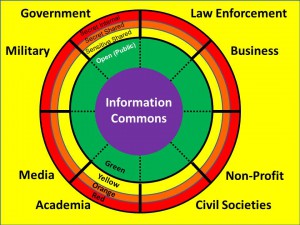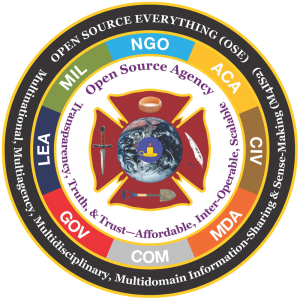
1/31, Washington, DC: “The Ivory Tower, the Beltway, and the Fourth Estate.” Organized by the Carnegie Corporation and the Stimson Center, the workshop's objective is to highlight the promise and challenges of bringing together academic social scientists in the area of national security affairs and strategize about how to strengthen the bridge between the Ivory Tower and the Beltway in a sustainable way in this area (including one panel focused on the Minerva program). Invitations are limited and targeted toward government and academic leadership; contact Michael Desch at Michael.Desch.4@nd.edu for more information.
Robert Steele will be attending the full program.
Below is a draft of the program:
Thursday, January 30, 2014:
– Arrive NLT 6:00 PM.
– Reception/dinner: 6:30 to 8:30 PM.
o Welcome: Ellen Laipson, Stimson Center and Michael Desch, Notre Dame. [confirmed]
– Keynote Address on Minerva Initiative and Rebuilding Academic Beltway After 9/11:
o Introduction: Ellen Laipson, President, Stimson Center.
o Dr. Peter Lavoy, Former Acting Assistant Secretary of Defense for Asian and Pacific Security Affairs and Director for Analysis, Office of the Director of National Intelligence (ODNI) [confirmed].
– Hospitality: 10 to 11 PM.
Friday, January 31, 2014:
– 8 to 8:30 AM: Continental Breakfast.
– 8:30 to 9:30 AM: What’s the Lay of the Land?
o Michael C. Desch, University of Notre Dame [Results of Policymaker Survey — Confirmed].
o Mr. Russell Rumbaugh, Stimson Center [Over-view of relevant US Govt. Programs? – Confirmed]
o Susan Peterson, College of William and Mary and TRIP [confirmed ]
– 9:30 to 10:30 AM: Report from the Ivory Tower — The Growing Concern About Academic Relevance and Policymaking:
o Chair, Bruce Jentleson, Sanford School, Duke and Bridging the Gap Project [confirmed].
o Stephen Van Evera, MIT and Tobin Project [confirmed].
o James Goldgeier, SIS, AU and Bridging the Gap Project [confirmed].
o Francis Gavin, MIT [confirmed].
– 10:30 to 10:45 AM: Break.
– 10:45 AM to 12:00 PM: Report from the Bridge, I — – The Minerva Initiative in Practice: What Have We Learned?
o Chair, Dr. Erin Fitzgerald, Program Director, Minerva Research Initiative, ASD(R&E) Basic Science Office [confirmed].
o Professor Michele Gelfand, University of Maryland [confirmed].
o Minerva Chair [Erin is inviting]
o Thomas Mahnken, Naval War College [confirmed].
– 12:00 to 1:30 PM: Lunch and Remarks — What Lessons Should We Draw From the Recent NSF Funding Cut-off for Political Science?
o Dr. LesLee Gilbert, Vice President, Van Scoyoc Associates [confirmed].
– 1:45 to 3:15 PM: Report from the Bridge, II The NIC Fellows and Academic Interface With the Intelligence Community:
o Chair, Ellen Laipson, President, Stimson Center. [confirmed]
o Dr. Mathew Burows, Former Counselor, the National Intelligence Council, ODNI and currently Strategic Foresight Initiative director in its Brent Scowcroft Center on International Security at the Atlantic Council.[confirmed]
o Professor Richard K. Betts, SIPA, Columbia [confirmed]
o Professor Robert Jervis, Department of Political Science, Columbia. [confirmed]
– 3:15 to 4:15 PM: Report From the Bridge, III: What Can Social Scientists Learn from Natural Scientists?
o Chair, Dr. Norman Neureiter, Acting Director of the new AAAS Center for Science, Technology and Security Policy (CSTSP), American Academy for the Advancement of Science [confirmed].
o Dr. William Colglazier, Science and Technology Adviser to the U.S. Secretary of State. [confirmed]
o Professor Frank von Hippel, Princeton University [confirmed]
– 4:15 to 5:00 PM: Wrap-Up – Building Sustainable Institutions and Partnerships to Make the Bridge Durable:
o Michael Desch, University of Notre Dame.
o Stephen Van Evera, MIT.
o Ellen Laipson, Stimson
o Mat Burrows, Atlantic Council.

Phi Beta Iota: As Robert Steele pointed out in 1997, the greatest threat to the US Government is the now cataclysmic gap between people with power and people with knowledge. Despite a quarter century of advocacy for an Open Source Agency and network that integrates and harvests the distributed knowledge from the “eight tribes,” Washington DC and the outlying theater commands persist in accepting the business as usual model that allows strategies and policies to be devised, and acquisition and operations to be pursued, without ethical evidence-based decision-support.

See Also:
1995 GIQ 13/2 Creating a Smart Nation: Strategy, Policy, Intelligence, and Information
2002 TIME Magazine The New Craft of Intelligence
2006 Forbes Blank Slate On Intelligence
2006 Open Source Intelligence (Strategic) 2.0
2009 Intelligence for the President–AND Everyone Else
2009 Fixing the White House & National Intelligence
2009 Human Intelligence: All Humans, All Minds, All the Time
2012 Foreword to NATO Book on Public Intelligence for Public Health [As Published]
2012 Washiington Academy of Sciences Briefing
2013 The Evolving Craft of Intelligence [As Published]
1976-2013: Intelligence Models 2.1
General Collections:
OSINT Top Contributions 1957-2006



